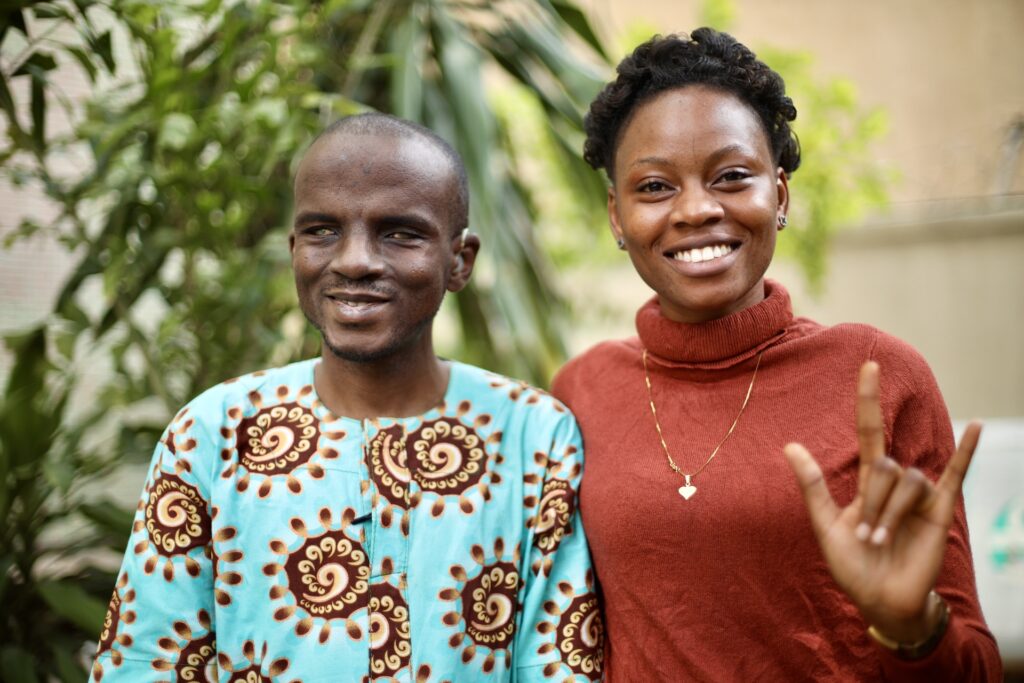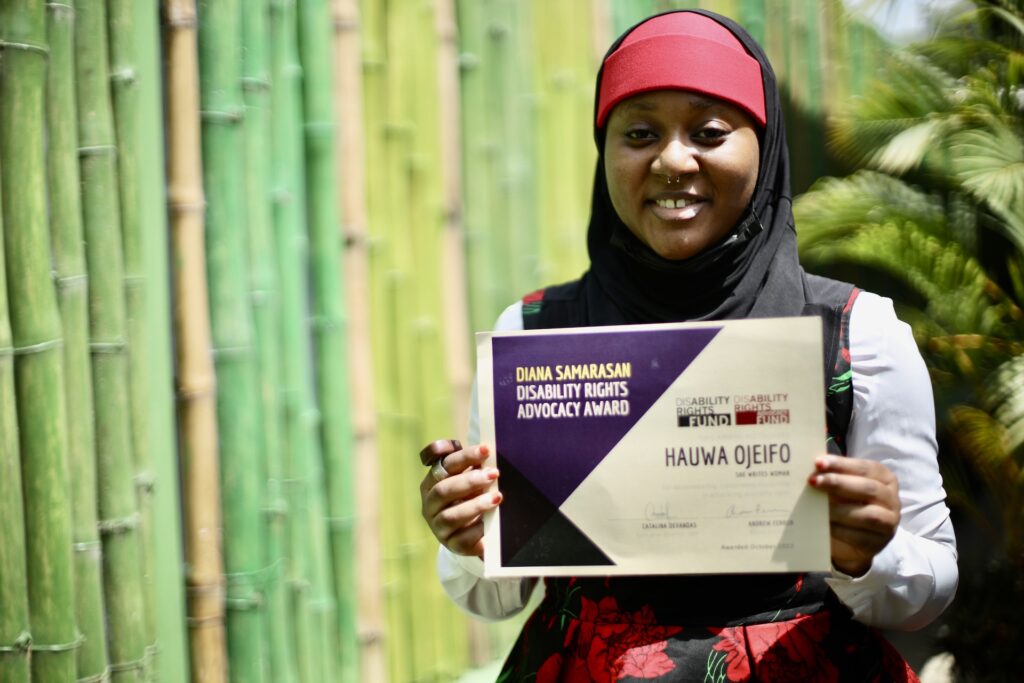Blog
Building a Movement for Inclusive Nigeria: Highlights of DRF's Grantee Convening
Blog by Theophilus Odaudu, Program Officer, Nigeria

In October 2022, the Disability Rights Fund (DRF) co-hosted a grantee convening in Nigeria with the Joint National Association of Persons with Disabilities (JONAPWD), the umbrella body of organizations of persons with disabilities (OPDs). The convening, titled ‘Leveraging Our Diversity to Build a Cohesive Movement that Leaves No One Behind,’ brought together over 26 OPDs comprising current grantees and coalition partners, reflecting the diversity of DRF’s Nigerian portfolio.
DRF began grantmaking in Nigeria in 2018, awarding its first grants to six OPDs. Since this initial funding, the portfolio has grown with 18 active grantees in the country today. “I want to thank DRF for what you are doing in this country. I remember the first grantee convening in 2019, the hall was scanty and most of us were not grantees. But today, see how you are helping the community to grow!” shared DRF grantee, Ishaku Adamu, President of the Nigeria Association of the Blind. Since DRF’s grantmaking and technical assistance in Nigeria, the disability movement has witnessed tremendous growth in its diversity, visibility, and capacity to engage meaningfully with the government and other stakeholders for results. Some of these achievements were highlighted during the 2022 grantee convening.
There are around 30 million persons with disabilities in Nigeria and several OPDs building a movement for inclusion. However, capacity and funding remain an issue.
With DRF’s funding in the country, more organizations now have access to resources to advocate for disability rights and drive the agenda of the movement.
This means that there are now more voices calling for rights and disability inclusion. As James Lalu, Executive Secretary of the National Commission for Persons with Disabilities (NCPWD), observed during his opening remarks at the 2022 grantee convening: “Immediately after DRF started supporting OPDs in Nigeria, I began noticing immediate impact! More disability groups started becoming active.” One such significant impact of DRF’s support for the disability movement in Nigeria was the signing of the Discrimination Against Persons with Disabilities (Prohibition) Act into law in January 2019. Prior, persons with disabilities and their allies were pushing the government to enact a law on disability rights, with DRF supporting this struggle by funding JONAPWD to strengthen its advocacy for this Act. This yielded results as the legislation was enacted in January 2019 with the establishment of a Commission to drive its implementation the following year. At the grantee convening, OPDs made a call for the full implementation of the law.

As an organization, DRF is practical about the principle of ‘leaving no one behind,’ and this reflects in all aspects of our operations, including grantmaking. The Nigerian movement, too, epitomizes this! The grantee convening was a gathering of diverse groups of persons with disabilities, with their organizations represented in DRF’s portfolio. As a participatory grantmaker, DRF is intentional about ensuring that a large portion of its funding in the country goes to marginalized groups and new voices in the movement. Hence, more than 50 percent of the grants in Nigeria go to women with disabilities-led organizations and gender-focused projects, and other marginalized groups, including persons with disabilities of diverse SOGIESC. This aligns with our Gender Guidelines Implementation Plan, which adopts a gender transformative approach to steer our strategies for inclusion with an intersectional approach. Some of the new voices amplified in the movement through the support of DRF are the Deafblind, persons with psychosocial disabilities, young persons with disabilities, and LGBTIQ+ persons with disabilities. This is remarkable progress for the movement, although we recognize that some voices are missing, and we will not relent in our outreach!
With the support of DRF, OPDs in Nigeria are pushing for change at multiple levels. During COVID-19 when restrictive measures were imposed by the government, DRF supported its grantees to adjust their projects to comply with the restrictions on in-person gatherings and repurpose their grants to advocate for disability rights. Many grantees implemented projects to improve access to information for persons with disabilities during this period and pushed for their inclusion in the government’s social interventions. Also, during the roll out of COVID-19 vaccines, the Centre for Citizens with Disabilities, with funding from DRF, were able to get the relevant agencies to prioritize access for persons with disabilities. The amended Copyright Bill (now awaiting the President’s approval) has incorporated the provisions of the Marrakesh Treaty to allow access to printed materials for persons who are blind and other print disabled persons. This was made possible through the advocacy of the Nigeria Association of the Blind with support from DRF. Also, DRF’s support for She Writes Woman to advocate for human rights in a mental health legislation has reached an advanced stage in the National Assembly. DRF grantees are also advocating for access to justice, inclusive education, sexual and reproductive health rights of women and girls with disabilities, prevention of gender-based violence, and the enactment of disability laws in Enugu State (in progress) and Abia State.
The 2022 grantee convening was an opportunity for grantees to network, learn, and build a strong and united voice. While the focus was on building a cohesive movement with discussions on board management, growing sustainable organizations, and inclusion of marginalized groups in the movement, grantees used the opportunity to identify some strategic projects and called upon the government to act. These projects include disability-inclusive aviation services, financial inclusion, and the recognition of sign language as an official language of communication in Nigeria. As a way of building capacity, ensuring participation, and promoting our values of ‘Nothing About Us Without Us,’ grantees were encouraged to lead uncomfortable but critical conversations on diversity and inclusion. For example, Timothy Adejumo of the Nigeria National Association of the Deaf moderated a panel on the inclusion of marginalized groups in the movement, which included DRF grantees representing women with disabilities, the deafblind, young persons with disabilities, and persons with disabilities of diverse SOGIESC as members. Grantees also appreciated a session led by Ejiro Okotie of Hope Inspired Foundation for Women and Youth on ‘Building A Sustainable Organization,’ where executive directors of well-established OPDs shared experiences growing their organizations and making founder successions work.
The interactive session with donors and partners, particularly with Foreign and Commonwealth Development Office (FCDO) and the U.S. Embassy, were invaluable, and we appreciate their engagement with our grantees. The highlight of the convening was the presentation of the Diana Samarasan Disability Rights Advocacy Award to three deserving Nigerian women activists with disabilities who are promoting disability rights at different intersections. Congratulations to these powerful intersectional feminists — Grace Jerry, Founder of Inclusive Friends Association, Benedicta Bayo, Program Officer for Diversity and Inclusion at WHER Initiative, and Hauwa Ojeifo, Founder of She Writes Woman.
The disability rights movement in Nigeria has grown remarkably in the last four years, but much remains to be done to achieve the desired societal changes. Persons with disabilities in rural areas and other minority groups are not visible in the movement. The resources to drive advocacy and push for systemic shifts is limited and more funding is needed for disability rights. As James Lalu noted: “Disability issues are everyone’s business. We must all put our hands together as a strong team to change the narrative!”